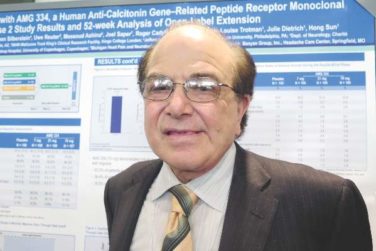Nurse Jackie is an amazing woman: She’s a fantastically competent and compassionate ER nurse who will do anything for her patients, and she is far better than the caricature ER docs she works with who all care more about their designer shoes and designer egos then about their jobs. She’s a wife – at least in the early episodes – and mother to two adorable girls with a life that includes Mommy and Me tap dancing classes. She somehow juggles it all.
In her fictional life as the star of a Showtime series, “ Jackie Peyton ” – played by actress Edie Falco, formerly known for her role as Tony Soprano’s wife, Carmela – manages even more: She does it all while popping pain pills by the handful throughout the work day and snorting whatever there is to snort. The interesting thing about Jackie is that her drug habit never interferes with her ability to function. There are no episodes where she makes mistakes or falls asleep. She doesn’t get too wired and is rarely irritable, and she certainly doesn’t pass out from overdoses. She shows up at work on time and never falls off her tightrope of responsibilities in the busy All Saints Hospital ER of New York City.
Without the drugs, she gets ill, but with them, she just functions. And she doesn’t just hold her own with a busy life; she also juggles the secret life of what it takes to get her daily fix, including daily lunchtime sex with the hospital pharmacist, who provides her with pain medicines for her aching back and doesn’t initially know that she’s married with children.
By Season 6, her personal life has broken down, and her daughter Grace, now an angry teenager with her own difficulties and secret life, notes that mom Jackie is incredibly good at hiding her drug use, and that no one can tell when she’s using.
With each season, Jackie’s personal life unwinds a little more, but it’s not because of the effects constant pill-popping has on her behavior; it’s because of the difficulties she has obtaining the drugs. If she could go to the store and buy large amounts of oxycontin and whatever else she takes, she’d have no problem. Her cauldron, however, is filled with constant lies and deception and the secret lives she lives to obtain drugs and to avoid boiling in her own self-made addictive mess.
I’m only at the end of Season 6, and Jackie already has had a year of sobriety – broken on her 1-year anniversary – and perhaps things will change in the final season, but so far, I’m struck by how well she manages to consistently function while living life high. It’s the perfect series to watch at the gym – entertaining, but it doesn’t ask much of the viewer.
You wouldn’t expect a review of a dark comedy TV series together with a review of a very serious memoir written by former Rep. Patrick J. Kennedy, but somehow, the two fit together for me.
In “A Common Struggle,” Patrick Kennedy and author Stephen Fried march through Kennedy’s long history of mental illness and substance abuse. Kennedy talks about his life in psychotherapy starting in childhood, related to his parents’ separation. He talks about the treatment he received in college and during his time as a state legislator in Providence, R.I., and how he parked far from his psychiatrist’s office so no one would learn he was in treatment.
Unfortunately, while he found treatment to be very helpful, he stopped when his doctor, Peter Kramer, became a celebrity in his own right after the publication of “Listening to Prozac” (New York: Penguin Books, 1997), and Kennedy became “spooked.” He goes on to talk about the many treatments – including lists of medications – he received over the years and his diagnosis of bipolar disorder, type II. But he doesn’t document what symptoms or episodes led to this diagnosis, and I couldn’t help but wonder how much of his mood disorder was part and parcel of his substance abuse problem. I imagine his doctors may have had the same problem.
So while Kennedy is vague about his psychiatric illness, he is much more forthcoming with his substance abuse problem. Like Nurse Jackie, he has the constant flow of pills – prescribed opiates starting with the diagnosis of a spinal tumor, a handful of Adderall here, some benzodiazepines there, and an enormous issue with alcohol on top of all that. Unlike Nurse Jackie, Kennedy wears the results of his addictions openly. He sleeps through mornings, and his schedulers know to accommodate this. He says things he otherwise wouldn’t while intoxicated, and he embarrasses himself and has others on edge. His mentor in the House of Representatives was Dick Gephardt, and Gephardt’s chief of staff summoned Kennedy to ask him to become chairman of the Democratic Congressional Campaign Committee – a tremendous honor for a 31-year-old congressman.
“There was, however, one catch,” the authors wrote. “ ‘If you do this,’ he said, ‘you can’t drink.’ ” Kennedy notes that he didn’t have the insight to realize how odd this was, and in reflection calls it his first intervention.
While most of his difficulties remained relatively private, one night he mixed Ambien and Phenergan , and in a state of confusion, he went for a drive and crashed into a Capitol Hill concrete barrier – an event that led to media coverage, scandal, and, as his chief of staff put it, “ ‘Patrick,’ he said, ‘we have a problem.’ ” While his father, Sen. Ted Kennedy, dismissed this as “a little fendah bendah,” the son made a public statement and checked himself into a rehab unit at the Mayo Clinic. It was to be the second of many attempts at rehab, his first having been in high school.
What makes “A Common Struggle” (New York: Blue Rider Press, 2015) so special is not just that it is a strikingly candid memoir of addiction and illness in a successful congressman, nor that the congressman happens to be a Kennedy with all the glamour and tragedy that come with being born into that family. What makes it special is the way that Kennedy and Fried weave so much more into this riveting book. It’s the story of one man’s life, taken in the full context of a family bound by tragedies: the assassinations of two of his uncles before his birth, an aunt who’d had a lobotomy and inspired a whole advocacy organization for developmental disabilities, two siblings who struggled with cancer, and two parents with their own addictions and scandalous behaviors. His mother’s psychiatric illness was severe enough that her children obtained guardianship, and that’s just a smattering of all the Kennedy family events that are reported here.
The story unfolds against the backdrop of major news events in America, and combines itself with the complex story of parity legislation and the struggle to legitimize brain diseases as worthy of funding, awareness, and destigmatization. And if that’s not enough for one book to do, it all takes place within Patrick Kennedy’s poignant and powerful desire to gain his father’s approval. Ultimately, the son achieves an extended period of sobriety in the context of falling in love and starting a family, well into his 40s.
Nurse Jackie, despite her drug use and personal woes, is fictional and entertaining. “A Common Struggle” is a serious book and heartfelt look at how addiction and mental illness destroy lives; there is little doubt here that without the Kennedy machine for support and privilege, a 20-year-old compromised college student would not have been able to start or maintain a successful political career. Kudos to Mr. Kennedy for sharing his pain and for helping to break the stereotype that those with mental illness and substance abuse can only be found in jails or under bridges.
Dr. Miller is coauthor of “Committed: The Battle Over Involuntary Care,” which was released last fall (Baltimore: Johns Hopkins University Press).




